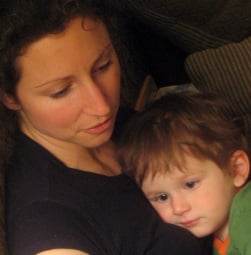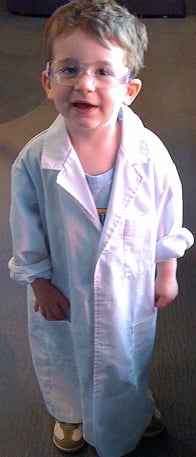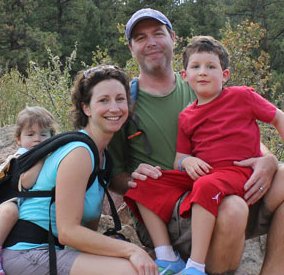 Meagan Gold, MPH and Eli
Meagan Gold, MPH and Eli
During her first year at the CU School of Medicine, Meagan Gold, MPH, was thinking she might become a pediatrician. Just before Christmas, she went to Children’s Hospital Colorado to participate in her first clinical work as a medical student. In a hospital room, she watched as a baby suddenly stiffened in his mother’s arms and then started shaking with a violent seizure.
“His mother calmly held her son and talked to him, saying the same words again and again,” Gold said quietly. “She said ‘You’re okay, look at me, come back to me, you’re going to be okay.’ It made such an impression on me.”
Five days later, Meagan Gold found herself holding her own 2-year-old son, Eli, in a hospital on the East Coast. Suddenly, Eli’s eyes rolled back, and he started that same violent shaking. Gold remembers screaming to the hospital staff, “He’s having a seizure!”
Then she recalled what she had seen just days earlier. “I thought of what that mom did,” said Gold. “I said to Eli, ‘Look at me, baby. Come back to me, Eli. I’m right here. Mommy loves you.’”
The seizure lasted 90 minutes. Meagan Gold never let go of her son.
What no one knew at the time was that from that day forward, everything in the life of Eli’s family would change—his mother’s career, his father’s goals and Eli’s future.
 Eli
Eli
DIAGNOSIS: “I know why your son has been sick …”
From the time Eli Gold was 6 months old, his mother and father, Jacob Gump, PhD, knew that something was not quite right with their first-born child. He had unexplained vomiting and lethargy; his vision was not good; he was missing developmental milestones. His parents had taken Eli to numerous specialists but still had no definitive diagnosis. The ongoing mystery made Gump and Gold start to wonder if they were imagining their son was sick.
When he was 28 months old, on a holiday vacation to visit family on the east coast, Eli became seriously ill. He couldn’t keep any food down; he became dehydrated. For the first time ever, his parents heard him make one specific complaint.
“He said, ‘Daddy, my head hurts,’” Gump said. “Only later did we realize that he had always had a headache.”
Eli became so sick that he was admitted to a community hospital, where the staff pumped him full of fluids. He continued to vomit and became less and less responsive, as his parents became more frantic.
“He was leaving us,” Gump said.
Then came the 90 minutes of hell.
It became clear to everyone that Eli needed a higher level of care. He was raced by ambulance to nearby Hackensack University Medical Center and admitted to the intensive care unit where he underwent a CAT scan of his brain.
“Within a very short time after we arrived there, the neuro-oncologist walked into the room,” said Gump. “He said to us ‘I know why your son has been sick for so long.’”
Gump and Gold actually felt relieved. “At last, we were going to get an answer,” Gump said. “Somebody agreed with us that there really was something wrong. We weren’t crazy.”
Then the physician said, “Your son has a brain tumor.”
Hearing those words, Jacob Gump remembers thinking to himself, “I am going to die, right here, right now.”
TREATMENT: “I don’t think he was far from dying …”
[gallery size="Content-Small" link="none" ids="19409,19408,19407,19406,19405,19404"]
Jacob Gump, PhD, is a post-doctoral fellow in the CU School of Medicine Department of Pharmacology. He researches cancer therapies on the cellular level, investigating how cells can avoid being killed during chemotherapy. He has done research on glioblastoma, a type of brain tumor which is 95 percent fatal within five years in adults. “It’s a death sentence tumor,” he said.
His mind immediately went to that death sentence, as he sat and listened to the physician delivering the news about Eli.
Then he heard three more words: “But it’s benign.”
Eli had been diagnosed with a craniopharyngioma, a benign tumor near the pituitary gland and the hypothalamus, located in the middle of the brain. It is a rare tumor; until that day, his father had never heard of it. In Eli’s case, the tumor was so large it was blocking the flow of cerebrospinal fluid, causing severe pressure on his brain. That’s why he had become so ill.
In that New Jersey waiting room, there was no time to discuss the diagnosis. Fluid in Eli’s brain had built up to dangerous levels. He was rushed into surgery. The neurosurgeon drilled through the cranium to relieve the pressure. As he pulled the drill out, fluid shot across the room.
“I don’t think he was very far from dying,” said Gump.
While Eli recovered from the surgery, his parents began a two-pronged effort to find the best treatment in the world for their son’s tumor. Gump called researchers he knew at the University of Colorado School of Medicine, including Stephen Hunger, MD, director of the Center for Cancer and Blood Disorders at Children’s Hospital Colorado and associate director of the University of Colorado Cancer Center. Gump also called Nicholas Foreman, MD, ChB, director of the Pediatric Neuro-Oncology Program at Children’s Hospital Colorado, because he had worked with Foreman before and knew him to be an excellent clinician and researcher.
 Eli
Eli
Gold consulted with a top pediatric neurosurgeon at New York University. She remembers him saying, “I think you should bring your son here. But if you don’t choose me, there is only one other person in the country I would recommend.”
That one person was Michael Handler, MD, professor at the CU School of Medicine Department of Neurosurgery and director of pediatric neurosurgery at Children’s Hospital Colorado.
It was not a hard decision. Eli’s parents brought him home to Colorado.
At Children’s Hospital Colorado, physicians inserted a catheter to deliver chemotherapy straight to the tumor in Eli’s brain, hoping to kill the tumor or at the least buy some time before he would need to have the tumor removed and follow-up radiation treatment. The chemotherapy continued, on and off, for a year. The tumor kept growing.
By the time Eli turned 3, his parents understood that it was time to take action. They could choose aggressive surgery to remove the tumor, but the surgery might injure the hypothalamus, which controls appetite and metabolism, causing Eli to be constantly hungry and likely obese. Or they could choose less aggressive surgery, followed by radiation. But radiation destroys brain cells.
“You torture yourself trying to decide which bad outcome you prefer,” said Gold.
Eli’s parents decided to attack the tumor aggressively with surgery, hoping to avoid radiation, but the tumor proved a wily foe. There was some damage to Eli’s hypothalamus during surgery. Even after the aggressive surgery, he still needed radiation.
Gold remembered what the New Jersey neuro-oncologist had told them after he delivered the diagnosis. “He said, ‘It’s a benign tumor in a very malignant location,’” she said. “Nothing could be more accurate.”
“It became clear to us that a benign tumor is not a benign illness,” said Gump.
RESEARCH: “I said, ‘Yes.’ No hesitation.”
 What struck Jacob Gump about his son’s illness was the dearth of information on effective treatments.
What struck Jacob Gump about his son’s illness was the dearth of information on effective treatments.
“We have come a long way in treating common childhood malignancies,” said Gump. “With brain tumors, we are not doing so hot. They were treating Eli’s tumor the same way they would have 30 years ago.”
By his own account, Gump spent “hours and hours” scouring literature from all over the world to try to find successful treatments for craniopharyngioma. He met frequently with Foreman in his lab, and they talked about how understudied this type of tumor was. The tumor is rare enough that no single center can work on it alone and get sufficient clinical data to learn more about potential treatments.
But the more Gump read and researched and observed his own son, the more he realized what Eli was facing.
“Plenty of kids get tumors and go on to live normal lives,” said Gump. “This tumor is not one of those. These kids have major problems.”
Unbeknownst to Gump and Gold, Foreman had begun research on the genetics of Eli’s tumor. “One day, Nick told me what he had been doing,” said Gump. “He also told me what they were finding, and he asked if I wanted to work with him on it. I said, ‘Yes.’ No hesitation.”
He would research his own son’s illness.
The seed money for the research came from the Morgan Adams Foundation, which helps fill the gap between the limited pediatric cancer research dollars available and critical projects that might otherwise go unfunded. The foundation is named after the founders’ daughter, who died in 1998 at the age of six from a glioblastoma. With foundation support, Eli’s tumor became the first craniopharyngioma brain tumor in the world to be gene microchipped, to find the genetic fingerprint of this particular type of tumor.
Today, Gump and his colleagues are advancing the research on craniopharyngioma by analyzing 40 tumor samples from multiple institutions around the world. He is researching how existing drugs might undermine the tumor cells as they grow and duplicate. Some days, he studies Eli’s cells.
“It’s cool when I analyze data with his tumor,” said Gump. “It helps me feel like I can understand more about what he has. It becomes science, which I know I can do! I can make a difference in our understanding and, we hope, our treatment of craniopharyngioma. I cannot help my son, but I can help other kids. That gives me immense purpose and gratification.”
Meagan Gold looks at her husband and shakes her head. “At the beginning, I asked him ‘Do you really think you can handle this?’” she said. “Because I couldn’t do it. I couldn’t work on my own child’s tumor.”
Jacob Gump pauses, looks down at his hands and quietly answers. “Now, looking back, it’s been harder than I expected—emotionally.”
What keeps Gump going are results, which he says are very promising. “We have found four different drugs that are already being used as treatments for other cancers that, we think, could be used to block cell growth in this tumor,” said Gump. “Our goal is to start one or more clinical trials with these drugs to see if we can change the way craniopharyngioma is treated for the better.”
[gallery columns="4" size="Content-Small" link="none" ids="17636,17635,17638,17637"]
TODAY: “I know I can make it better …”
Eli Gold is 6 years old now and attending school. He undergoes therapy for gross motor disabilities, so it’s difficult for him to run around the playground. He also has trouble reading social cues. Combined, those two challenges make it hard for him to play with children his own age.
He has no pituitary function, no sex hormones, no stress hormones, no hormones that regulate his thyroid or his growth. He takes three different medications, three times a day, and one injection every night. He is blind in one eye and half-blind in the other. The damage to his hypothalamus means he is hungry all the time.
He loves dancing, singing, playing the piano, creating art and playing with his little sister, and he is very smart.
Eli is beginning to understand that he is different from other children. Recently, he asked his mother, “Am I going to be this way forever?”
Meagan Gold will graduate from medical school in May, 2013. She has been honored with an Adler Scholarship Award for the work she did creating PALS—Parent Allies for Love and Support. PALS is a parent-to-parent peer mentoring program providing emotional, informational and affirmation support to parents with a child battling cancer.
“I am able to offer a compassionate perspective to these families,” said Gold. “I know how devastating it is to have a diagnosis that changes all the dreams you have for your child.”
Gold will intern at Presbyterian St. Luke’s/Colorado Health Foundation. She will return to the University of Colorado for her anesthesia residency. Although she didn’t know it, her plans to become a pediatrician ended four years ago when Eli was diagnosed. “I have a patient at home every day,” she said. “That’s my pediatrics.”
The divorce rate for medical students is high, and the divorce rate for parents of children with chronic diseases is even higher. The Gold and Gump marriage has faced both and survived. Ask them about their strategies and they laugh.
“Only one person is allowed to break down at a time,” said Gold. Last summer, they went away together for 24 hours, the first time in more than five years they have had a get-away.
They also have a second child, Noa, a little girl. “It is very healing, realizing what normal is,” said Gold. Noa is reaching milestones at 18 months that Eli has not yet reached.
After two years of work, Jacob Gump will present his craniopharyngioma research findings at a conference this summer. He does not plan to mention the role his son played in his findings. But as Eli’s father, he lives with a daily reminder that his research is vital and worth pursuing for children like his son.
“I can make it better,” he said. “I know I can make it better.”
